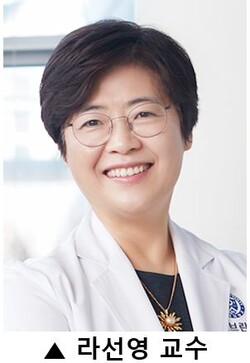A research team at Severance Hospital has proposed a new primary treatment strategy for HER2-negative advanced gastric cancer.

The oncology team of Yonsei Cancer Center, led by Professor Rha Sun-young, conducted a treatment combining Keytruda with conventional chemotherapy for patients with HER2-negative advanced gastric cancer.
Gastric cancer incidence is particularly high in Asia, with Korea recording it as the fourth most common cancer (10.8 percent) in 2020, according to national cancer statistics. It is one of the deadliest cancers, along with lung, liver, and colorectal cancers.
While drug development in the West has led to new drug discoveries targeting various cancers, there has been slower progress for treatments targeting gastric cancer due to its lower incidence compared to Asian countries.
Advanced gastric cancer is categorized based on HER2 expression into positive and negative types, with the negative type comprising about 85 percent of cases, mostly at stage 4. These patients typically receive standard chemotherapy as a first-line treatment, but the prognosis is not promising.
Recently, the potential of immunotherapy in treating HER2-negative gastric cancer has been highlighted.
As a result, Professor Rha’s team, along with other global researchers, conducted a global phase 3 clinical study, known as the KEYNOTE-859, comparing the efficacy of Keytruda combined with chemotherapy versus chemotherapy alone as a first-line treatment in HER2-negative gastric cancer patients.
In the clinical study, 1,579 patients were randomly assigned to receive either Keytruda (200mg every three weeks for up to two years) combined with chemotherapy or chemotherapy alone.
The results showed that the combination therapy significantly improved not only the primary endpoint of overall survival (OS) but also secondary endpoints such as progression-free survival (PFS), objective response rate (ORR), duration of response (DOR), and safety compared to chemotherapy alone.
After an average follow-up of 31 months, the combination therapy reduced the risk of death by 22 percent compared to chemotherapy alone, regardless of the expression of the protein PD-L1, which inhibits immune cell activation in gastric cancer cells.
The median OS for the combination therapy was 12.9 months, compared to 11.5 months for chemotherapy alone. Secondary endpoints such as PFS (6.9 months for combination therapy vs. 5.6 months for chemotherapy alone) and ORR (51.3 percent vs. 42 percent) were also higher with the combination therapy.
The duration of response to the drug was also longer with the combination therapy, lasting eight months compared to 5.7 months for chemotherapy alone.
Notably, the Keytruda combination therapy showed greater improvement in patients with higher PD-L1 expression. In patient groups with a PD-L1 expression rate of the combined positive score (CPS) 1 or higher and 10 or higher, the Keytruda combination therapy demonstrated higher therapeutic effects in all evaluation parameters compared to chemotherapy alone.
"Following the previously announced Opdivo, KEYNOTE-859 has proven the long-term survival effects of immunotherapy in HER2-negative advanced gastric cancer,” Professor Rha said. “It is expected that this will provide safer and more improved treatment options for patients who previously had limited choices in therapy.”
The results of the research were published in the Lancet Oncology.
Related articles
- Severance Hospital claims top spot on the industry-wide customer satisfaction index for 13 consecutive years
- Yonsei Cancer Hospital tops 500 robotic breast surgeries – a world record
- Gangnam Severance Hospital makes breakthrough in early-onset Alzheimer's diagnosis
- YUHS chief Yoon appointed as new president of Yonsei University
- Zimbabwean surgeon Allan Ngulube wins Severance Hospital's Avison Award
- Acclaimed pianist Son Yeol-eum surprises Severance Hospital with hopeful melodies through Going Home Project concert
- MSD's Keytruda wins 2 new approvals for 1st-line gastric cancer, early-stage lung cancer
- Gastric cancer patients show decreased efficacy to immunotherapy following antibiotic exposure prior to treatment
- Severance Hospital finds new causative factor for retinoblastoma
- Severance Hospital marks 'world's 1st' to perform 40,000 robotic surgeries
- Moderate exercise enables longer lives for older adults despite fine dust: study

